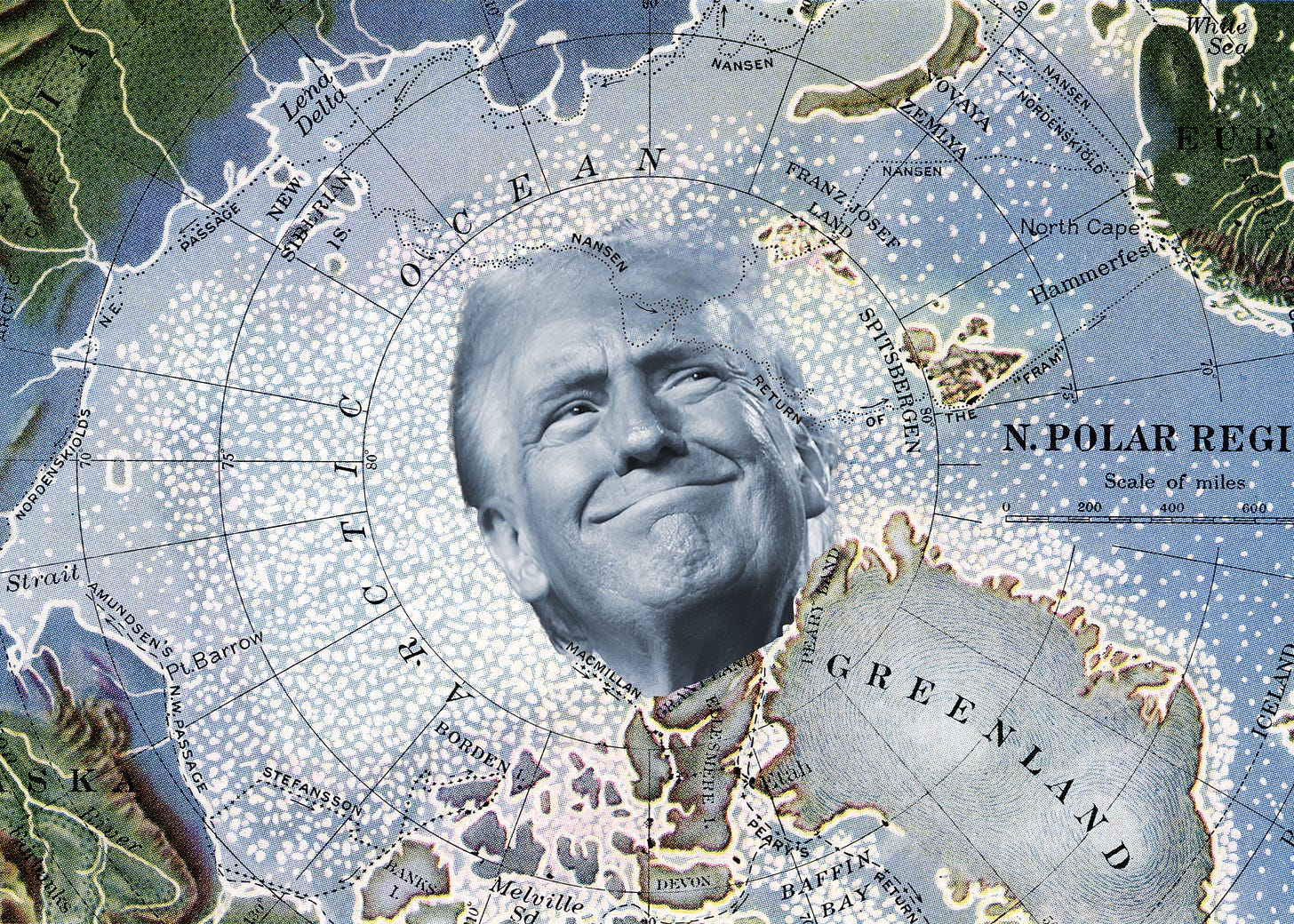From Russia, Dreams of Greenland
Did Trump get his takeover idea from a decade-old satirical novel? (No, but buckle up.)
THERE HAS BEEN RAMPANT SPECULATION about the “real” reasons for Donald Trump’s declarations about acquiring Greenland by economic or even military means—is it for national security? Natural resources? Or because of China? One underconsidered possibility is that he’s acting out a fantastic vision from a Russian satirical novel published in 2015.
Not intentionally, of course. As we know, Trump isn’t much of a reader (especially not of books by Russian dissidents). For that matter, I also don’t believe that, as Yale historian Timothy Snyder warns, Trump’s Greenland bluster may be intended to enable the authoritarian imperialistic regimes in Russia and China by undermining “the international legal order” based on the sovereignty of states and the inviolability of borders—or even recycling Vladimir Putin’s arguments defending his land grabs in Ukraine. Sovereignty and precedent and international law are not categories in which Trump appears to think.
Russian-American journalist Michael Nacke is probably much closer to the truth when he suggests that ultimately, Trump is acting in the interests of Trump and no one else: It’s all about self-aggrandizement and being the center of attention. Narcissism is a far better explanation for Trump’s behavior than either Russian interests or American interests. Yes, America has legitimate security interests in Greenland—but no one has yet explained what benefits Trump’s bluster could have that couldn’t be advanced by simply talking to Denmark, our ally which currently controls the Arctic island.
Nonetheless, the fact that Trump’s Greenland gambit looks vaguely like a farcical attempt to reenact Putin’s 2014 Crimea takeover—complete with a trip to the island by Donald Trump Jr. cosplaying as Putin’s “little green men” and getting a group photo taken with locals, reportedly homeless people paid to pose in MAGA hats—rightly sets off some alarm bells. And this is where the uncanny echoes of the 2015 novel, The Crimson Pelican by Vladimir Voinovich, come in.
Voinovich, about whom I have previously written for The Bulwark, lived an extraordinary life (he died in 2018 at the age of 85); I was lucky to be briefly acquainted with him in his final years. The Crimson Pelican, his last novel, chronicled and satirized the surreality of Putin’s Russia through a storyline in which reality intersects, overlaps, and blurs with dreams and visions experienced by the narrator during an endless ambulance ride.
In one such dream, the narrator, an elderly writer—and Voinovich alter ego—finds himself in the midst of a raucous celebration and is baffled by chants of, “We’ve got Green!” The ambulance paramedic, beside herself with excitement, tells him that Russia has annexed Greenland, now “a sacred and indivisible territory of the Russian Federation.” It turns out that a squad of “polite little men” from Russia arrived on the island to defend the native “Greenies” from genocide by “a fascist Danish clique” and took over with no resistance. Initially skeptical locals acquiesced after being assured of “a big hike in pensions and salaries” (but “failing to realize the hike would be in rubles”). Now, jubilant crowds proclaim the eternal unity of Russians and Greenlanders, while Russian TV pundits explain that the Greenlanders “had been suffering for years because their [Danish] oppressors forbade them to speak Russian, a language they loved dearly despite not knowing a single word of it.”
When the narrator wakes up, the patriotic paramedic scoffs at the notion that Russia could have taken Greenland—but informs him that it’s not a total loss: “No, we haven’t taken Greenland and we never had any intention of taking it, because it’s huge, cold and covered with ice, and no one really wants it—not even the Greenlanders themselves. But we did take Crimea.”
(This chapter is included in excerpts from The Crimson Pelican which I translated in 2016 at Voinovich’s request when the book was shopped around to American publishers.)
The fantastical and absurd “annexation of Greenland” is clearly meant to be a comical analogy to the Crimea annexation. But ten years later, it does feel uncanny—especially since some Russian propagandists are now making noises about either preempting Trump with a Russian seizure of Greenland or, “if all else fails,” making a deal with Trump to “split Greenland in two parts.”
Voinovich was often credited with accidental powers of prophecy, largely on the strength of his 1986 dystopia Moscow 2042 in which a futuristic, post-Soviet Russia is ruled by a dictatorship in which the KGB is fully merged with the Russian Orthodox Church—and the man at the head of this regime is, just like Vladimir Putin, an ex-KGB officer once stationed in Germany. Could the annexation of Greenland turn out to be another prophetic moment?
It’s hard to tell, at this point, whether Trump’s quest for his own version of “We’ve got Green” will turn out to be anything more than a passing attention grab or distraction. But if he does view it as a serious project, take note: Voinovich’s prophetic scenarios never end well.





